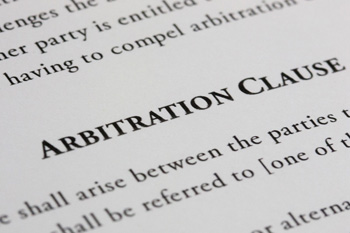
While a voluntary arbitration is where the parties mutually agree after a dispute has arisen to submit it to arbitration, a mandatory arbitration clause is a contractual provision in which one party requires the other to arbitrate their disputes.
Let us discuss the advantages of arbitration over court proceedings.
- Faster process saves time – Arbitration is typically faster and less expensive than time-consuming, costly litigation in court. However, the time varies from state to state. For instance, in Virginia, a trial date is normally about twelve months from the date the lawsuit is filed. A date for the arbitration can usually be obtained a lot faster than a court date. Also, the result can be a much faster process, with less burdensome document discovery and the absence of other discovery tools such as depositions. The arbitrator can set more compressed deadlines in absent motion practice such as dispositive motions, than litigation in the courthouse might dictate.
- Much lower costs – Mainly due to the compressed schedule for the completion of discovery and trial, costs are much lower in arbitration than court litigation. In court trials, expenses are mainly related to pre-trial discovery processes, such as written interrogatories and depositions of witnesses. As the rules of evidence are often more relaxed than in a trial, costs are lower in preparing for the arbitration. Also, the arbitrator can set more compressed deadlines on absent motion practice, such as dispositive motions, than litigation in the courthouse might dictate.
- Comfort and Privacy – Arbitration is a private procedure, held in an informal surrounding, unlike litigation that takes place with all courtroom formalities. As the arbitration filings are not made through a public filing system, the dispute and the resolution can be kept confidential among the arbitrators and participants.
- Opportunity to select the arbitrator – Unlike the litigation process, participants are free to choose the arbitrators from a pool of professionals. For highly technical subject matters of the dispute, arbitrators with an appropriate degree of expertise can be appointed, thus they may provide a greater level of expertise than a judge.
Disadvantages
While arbitrating claims has significant benefits, there are also disadvantages.
- Absence of a firm set of rules – With more flexible rules than a civil procedure, in arbitration there is more room for attorneys to find things to fight about. Also, as the procedure is without a firm set of rules to rely on, there can be uncertainty/ unpredictability as to how an arbitrator will rule on these procedural matters.
- Process limitations – Though limited discovery in arbitration proceeding may move the process at a faster pace, lack of details can prevent a full understanding and evaluation of the adversary’s strengths and weaknesses.
- Cost may go higher than expected – Even if the costs are usually less than litigation through trial and appeal, it can be higher than clients may expect. The arbitrator’s fees can be quite substantial, depending on the complexity of the matter.
- Errors of law by the arbitrator counts – While litigation comes with an appeal process, arbitration isn’t so. If a party believes the arbitrator got it wrong, recourse is limited and that decision will likely still stand.
Factors that need to be considered to ensure that the arbitration clause is itself legally enforceable and suits your business needs vary depending upon the circumstances such as the form of arbitration, the number of arbitrators to be chosen, the location of the arbitration and the rules to be adopted. Timely arbitration transcription services offered by experienced outsourcing companies help to obtain error-free transcripts for arbitration and pre-arbitration proceedings, law reform, post-hearing briefs as well as agreements.

